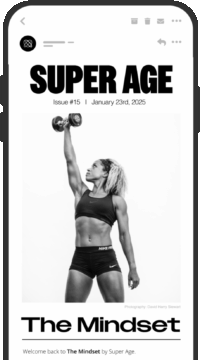The Truth About Longevity Tests: What’s Worth Your Time?
JP Danko
Most tests give you numbers. [lon-jev-i-tee]nounLiving a long life; influenced by genetics, environment, and lifestyle.Learn More tests give you power. Canyon Ranch’s Dr. Jen Wagner shares the screenings that truly extend your years.
When it comes to longevity, testing may feel like both a gift and a trap. You can measure almost anything these days, your genetics, your epigenetic age, even your gut bugs, but does all that data actually help you live longer and better?
In our second Super Age Live, David Harry Stewart sat down with Dr. Jen Wagner, Chief Health & Performance Officer at Canyon Ranch, to cut through the noise. Her advice: build the cake before you fuss about the sprinkles. Translation? Focus on the tests that reveal something actionable, not just “cool to know.”
The Longevity Testing Hierarchy
Dr. Wagner frames testing like layers of a cake. The foundation is simple, accessible measures that meaningfully extend [helth-span]nounThe number of years you live in good health, free from chronic illness or disability.Learn More. The frosting and sprinkles, while fascinating, don’t do much if you haven’t nailed the basics. “Our diagnostic capabilities are outpacing what we do with all this data,” says Dr. Wagner. The question, she says, is: “Where can we truly intervene to expand our healthspan versus the sprinkles on top of the cake?”
Step One: Start with the Core Four Longevity Tests Everyone Should Do
These are the baseline tests every longevity-minded adult should know:
- Blood Pressure
Check weekly at home, not just at the doctor’s office. A running average tells you far more than one nervous, rushed reading in the clinic. High blood pressure silently drives [hahrt dih-zeez]nounConditions affecting heart health and circulation.Learn More, which is the #1 killer worldwide. “And if you’ve tested your blood pressure before going to see your physician, bring those numbers with you so they can see the trend,” says Dr. Wagner. - Comprehensive Metabolic Panel (CMP)
Covered by most insurance, this gives you a look at kidney and liver function, electrolyte balance, and early signs of chronic [in-fluh-mey-shuhn]nounYour body’s response to an illness, injury or something that doesn’t belong in your body (like germs or toxic chemicals).Learn More. Inflammation, Dr. Wagner reminds us, is the fuel for accelerated aging. - Advanced Lipid Testing
Move past the basic HDL/LDL. “We need to go beyond our standard HDL, LDL panels, to look at things like ApoB, Lp(a), and particle size to get a better quality and functionality of our lipids,” says Dr. Wagner. These markers are stronger predictors of heart disease, especially for women in midlife whose lipid profiles can shift dramatically through menopause. - Hearing Screening
“It’s not sexy, but hearing loss is a contributor to morbidity and mortality,” says Dr. Wagner. Untreated hearing loss doubles dementia risk and fuels loneliness. A quick annual test, and hearing aids if needed, can add quality years of connection and vitality.
Step Two: High-Impact Healthspan Tests
Once you’ve nailed the basics, layer in longevity tests that reveal both risk and opportunity for improvement:
- VO₂ Max Test
The uncomfortable treadmill/bike test with a mask that measures your peak oxygen use. Why bother? Because cardiorespiratory fitness is the single strongest predictor of lifespan. Elite VO₂ scores correlate with a 5x lower risk of mortality compared to the lowest group. “Nothing else we can do, not even a medication, comes close to that,” says Dr. Wagner. And unlike genetics, you can train this number higher.
- DEXA Scan
Gold standard for bone density and body composition. “The DEXA scan is painless, takes about 10 minutes, and shows bone density, body composition, and visceral fat, the inflammatory fat around our organs that really contributes to chronic disease,” says Dr. Wagner, adding that there are commercial scales that say they measure visceral fat, too. “But I would get a DEXA and then go get on the scale and see how it correlates, and then you can use that scale to trend without having to go back and get a DEXA all the time.”
Optional, But Know the Limitations
These tests fall into the “sprinkles” category. They can be motivating, but they don’t replace foundational work.
- Genetic Testing (ApoE, BRCA, etc.)
Valuable if you have a strong family history, but results can cause unnecessary anxiety. “Our genotypes are not always expressed in our phenotypes, meaning you might carry a gene that increases risk, but that doesn’t mean you’ll get the disease,” cautions Dr. Wagner. Knowing you carry a genetic risk doesn’t necessarily change the prescription: exercise, nutrition, stress management, and sleep. - Epigenetic Clocks
Measure biological vs. chronological age via DNA methylation. Fascinating? Yes. Actionable? Not yet. “They’re really cool, but we don’t have targeted interventions to change methylation patterns, and they haven’t been duplicated consistently across tests,” she notes. If it motivates you to double down on lifestyle basics, great. But don’t mistake these for medical directives. - [mahy-kroh-bahy-ohm]nounThe community of microorganisms (bacteria, viruses, fungi) living in a particular environment, especially the gut.Learn More Panels
The science is evolving. Results often come bundled with supplement upsells. “I worry when someone offers you a microbiome test and 18 supplements to support whatever it finds,” cautions Dr. Wagner. “Just be aware of the commercial side of it.” Unless you’re managing a medical condition with an integrative team, focus on a diverse, plant-forward diet first. - Cancer Blood Tests
Promising for early detection, but not yet a replacement for standard cancer screenings. “Please still do your regular cancer screenings,” says Dr. Wagner. “We have good data that colonoscopy and mammograms decrease mortality. We don’t have that data yet for these blood-based screenings.” Think “supplement,” not “substitute.”
Sleep and Brain Health: Two Tests You Shouldn’t Overlook
Sleep and brain health deserve a spot on your radar:
- Sleep Screening
“If your sleep tracker shows repeated micro-awakenings or dips in oxygen, that’s a signal to get a formal sleep study,” says Dr. Wagner. Especially important for women, whose sleep apnea symptoms often go unnoticed. Look for daytime headaches, irritability, or focus issues. Home sleep devices and FDA-approved trackers now make evaluation easier than ever. - Cognitive Testing
Baseline screenings can identify memory or reaction-time issues early. And here’s the empowering truth: [noor-oh-plas-tis-i-tee]nounThe brain’s ability to change and adapt through experience.Learn More doesn’t vanish with age. If a test flags concerns, targeted training and therapies can improve brain performance. “And remember: True impairment isn’t forgetting where your keys are—it’s forgetting what keys are for,” says Dr. Wagner.
Your Longevity Test Checklist by Decade: 30s, 40s, 50s, 60s+
- 30s and 40s: Establish baselines. Lipids (especially for women), DEXA, VO₂ max, and blood pressure trends.
- 50s: Track changes aggressively. Repeat DEXA, monitor visceral fat and [muh-suhl mas]nounThe total weight of muscle in your body, critical for longevity.Learn More, double-check cardiovascular metrics.
- 60s and beyond: Don’t let guidelines phase you out of care. If you’re vibrant at 75, keep doing screenings—your healthspan still has decades ahead.
“People ask me all the time: what’s the pill that will help me live longer?” says Super Age Founder David Harry Stewart. “The answer is VO₂ max. Cardiorespiratory fitness beats every medication we have.”
So before you drop thousands on exotic longevity tests, remember Dr. Wagner’s cake analogy: build the foundation first. Blood pressure, metabolic panel, lipids, hearing, DEXA, visceral fat, VO₂ Max. Those are the data points that extend life and health in meaningful ways.
Everything else? That’s dessert.
Next Step: At your next checkup, bring a short list: blood pressure log, CMP, advanced lipids, and ask about a DEXA or VO₂ test. Use your precious minutes to focus on what truly changes the trajectory of your healthspan.
Watch the Full Conversation
Announcing! Super Age and Canyon Ranch
Four Days. Your Healthspan Extended.
We’re proud to be partnering with Canyon Ranch for the most advanced longevity immersion in the world. If you’re ready to take your healthspan work from theory to practice, the Canyon Ranch LONGEVITY8™ Super Age Cohort is for you. It’s a four-day precision program that delivers clarity, confidence, and a personalized roadmap for decades of thriving.
Discover the Canyon Ranch LONGEVITY8™ Super Age Experience →
Read This Next
The information provided in this article is for educational and informational purposes only and is not intended as health, medical, or financial advice. Do not use this information to diagnose or treat any health condition. Always consult a qualified healthcare provider regarding any questions you may have about a medical condition or health objectives. Read our disclaimers.

